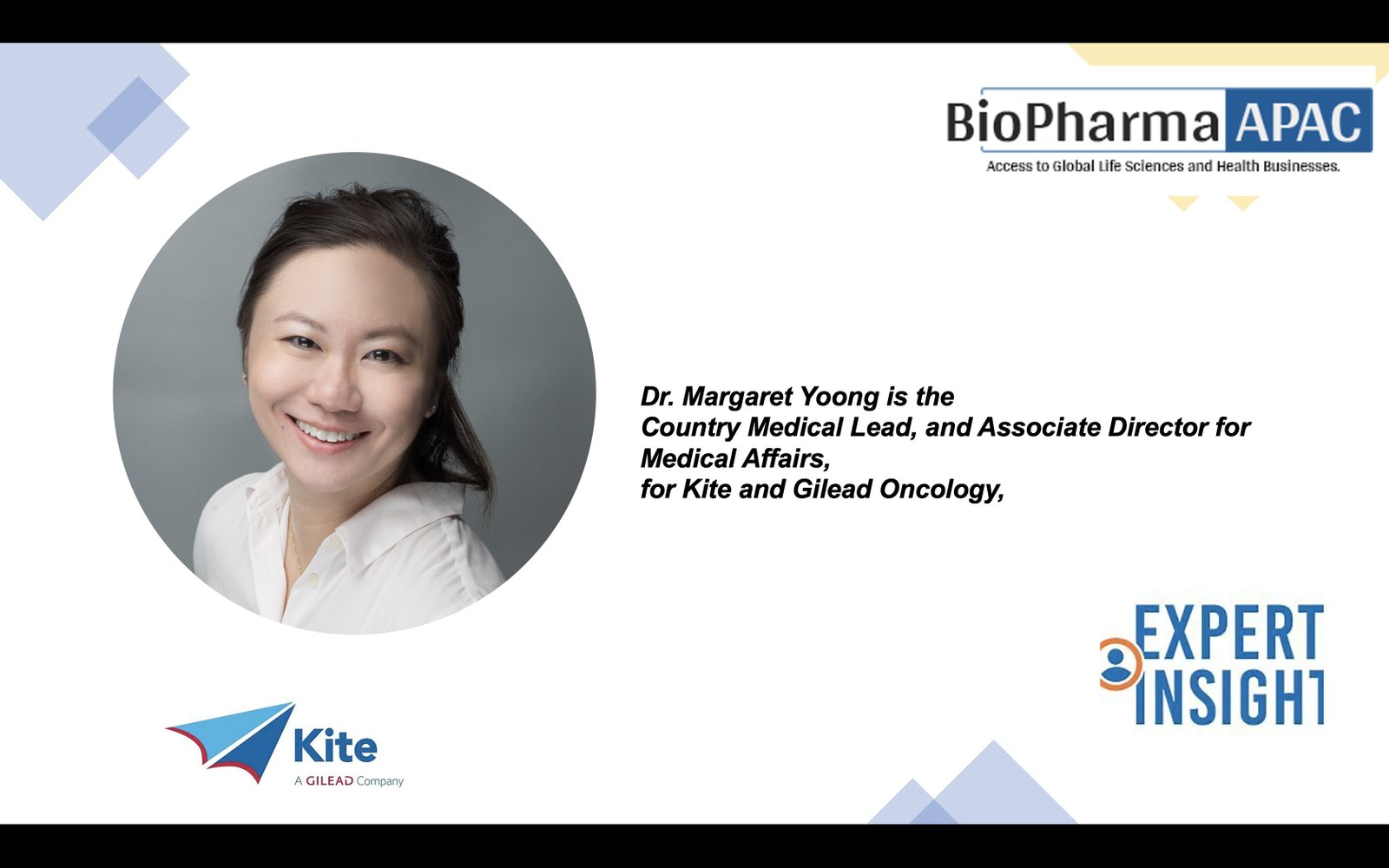Gilead Sciences Singapore Discusses Access and Affordability of CAR T-Cell Therapy in Singapore and Beyond
19 June 2023 | Monday | News

Margaret Yoong, Associate Director of Medical Affairs & Country Medical Lead at Gilead Sciences Singapore,
Can you elaborate on the current availability and accessibility of CAR T-cell therapies in Singapore? What are the key considerations or barriers that need to be addressed to improve access for patients?
In 2021, Singapore became the first country in Southeast Asia to approve CAR T-cell therapy for medical use. At the time of writing, there are two cell therapies that have received approval from the Health Sciences Authority (HSA) in Singapore.1 These therapies are only approved to treat a limited set of haematological malignancies, including non-Hodgkin lymphoma (NHL) and B-cell acute lymphoblastic leukaemia (ALL).
In March 2023, the HSA of Singapore granted marketing authorisation for Yescarta® (axicabtagene ciloleucel) as a treatment for adult patients with relapsed or refractory large B- cell lymphoma (LBCL), after two or more lines of systemic therapy, including diffuse large B- cell lymphoma (DLBCL) not otherwise specified, primary mediastinal large B-cell lymphoma and high grade B-cell lymphoma, DLBCL arising from follicular lymphoma.1
Axicabtagene ciloleucel must be administered at a certified healthcare facility. Currently, institutions such as the Singapore General Hospital (SGH) and Parkway Cancer Centre are qualified to administer CAR-T cell therapy to patients. Patient safety is a priority and Gilead and Kite Oncology use a rigorous training process in accordance with the requirements of our approved Risk Management Plan to qualify these certified healthcare facilities that can administer axicabtagene ciloleucel.
In terms of financing innovative therapies like CAR T-cell therapy, what strategies or models can be implemented to ensure affordability for patients while maintaining the sustainability of the healthcare system in Singapore?
When developing the price of CAR T-cell therapy, Gilead and Kite Oncology follow an industry benchmarked approach that is grounded in the belief that pricing should be driven by the value that a therapy provides to patients and their carers, clinicians, payors and the broader healthcare system. Gilead and Kite Oncology continue to work closely with stakeholders in Singapore to enable timely and sustainable access to CAR T-cell therapy for eligible patients in need of this treatment option.
Are there any ongoing collaborations or partnerships between Kite and healthcare providers, regulatory bodies, or other stakeholders in Singapore to enhance the adoption and accessibility of CAR T-cell therapy? If so, could you provide some examples or details?
Following the approval of axicabtagene ciloleucel by HSA in Singapore, Gilead and Kite Oncology are committed to qualify hospitals designated as authorised treatment centres and
to partner with the medical community to offer comprehensive training so that staff at certified healthcare facilities are equipped with the skills required to support patients.
How do you envision the role of government policies and regulations in facilitating the availability and affordability of CAR T-cell therapies? Are there any specific policy changes or initiatives that you believe would significantly impact access to these therapies in Singapore?
CAR T-cell therapy breaks new ground in cancer treatment and requires new processes and knowledge to support patient access.
Looking beyond Singapore, what are the opportunities and challenges in expanding access to CAR T-cell therapy across the Asia-Pacific region? Are there any regional trends or collaborations that could potentially influence the future landscape of CAR T- cell therapy in this region?
Gilead and Kite Oncology are committed to contributing towards making Singapore a center of excellence for CAR T-cell therapy in Southeast Asia, as Singapore is a leading biomedical sciences hub in Asia and has strategic geographical proximity to other countries in the region. Gilead and Kite Oncology in Singapore will be supported by our state-of-the-art manufacturing facilities.
References
1 Health Sciences Authority. (2023). Register of Class 2 cell, tissue or gene therapy products. [Online]. Available at: https://www.hsa.gov.sg/ctgtp/ctgtp-register. [Accessed date: June 2023
Most Read
- Innovations In Magnetic Resonance Imaging Introduced By United Imaging
- Management of Relapsed/Refractory Multiple Myeloma
- 2025 Drug Approvals, Decoded: What Every Biopharma Leader Needs to Know
- BioPharma Manufacturing Resilience: Lessons From Capacity Expansion and Supply Chain Resets from 2025
- APAC Biopharma Review 2025: Innovation, Investment, and Influence on the Global Stage
- Top 25 Biotech Innovations Redefining Health And Planet In 2025
- How Health Systems Are Reshaping Drug Adoption, Partner Models, and Market Access in 2026
- The New AI Gold Rush: Western Pharma’s Billion-Dollar Bet on Chinese Biotech
- Single-Use Systems Are Rewiring Biopharma Manufacturing
- The State of Biotech and Life Science Jobs in Asia Pacific – 2025
- Asia-Pacific Leads the Charge: Latest Global BioSupplier Technologies of 2025
- Invisible Threats, Visible Risks: How the Nitrosamine Crisis Reshaped Asia’s Pharmaceutical Quality Landscape
Bio Jobs
- The State of Biotech and Life Science Jobs in Asia Pacific – 2025
- Avantor’s New CEO Ligner Aims to Unlock Global Potential and Deliver Shareholder Value
- AstraZeneca Commits $50 Billion to U.S. Expansion by 2030 in Biggest-Ever Global Investment
- Thermo Fisher, SAMRC, and South Africa’s Department of Science and Innovation Launch CATIR to Nurture Next-Gen Scientists
- Cube Biotech Appoints Former Sartorius CEO Dr. Joachim Kreuzburg to Board of Directors
- FDA’s AI Transition Marks a Turning Point in Drug Review: Industry Faces Pressure to Adapt Amid 20% Workforce Cut
- WuXi XDC Completes Mechanical Build of Singapore Bioconjugate Manufacturing Hub
News
Editor Picks











